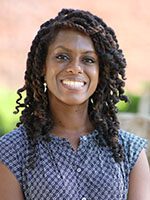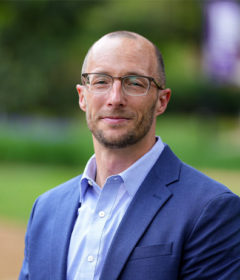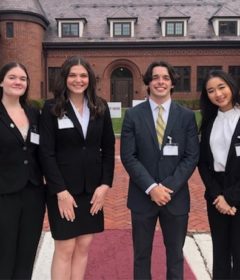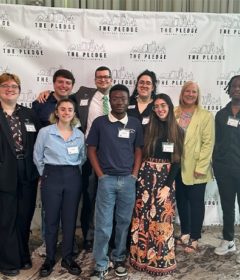Flash Forum Answers Students’ Questions about Stetson Drinking Water

At a Flash Forum on Water Quality moderated by the Institute for Water and Environmental Resilience this week, a group of about 40 Stetson students had the opportunity to get an answer to their central question: Is it safe to drink the water?
 A panel of experts explained Wednesday night, March 29, that the results of random, regular testing by the City of DeLand and specific testing by an independent laboratory concluded that Stetson’s water meets federal and state drinking water standards.
A panel of experts explained Wednesday night, March 29, that the results of random, regular testing by the City of DeLand and specific testing by an independent laboratory concluded that Stetson’s water meets federal and state drinking water standards.
The issue of Stetson’s water quality was sparked by a class project on water quality testing developed by Nicole Porther, Ph.D., a visiting assistant professor in Public Health. Porther said her students used test strips for their project.
Associate Vice President for Facilities Al Allen explained that when he learned of the testing and concerns he posted “out of order” signs on water fountains in affected building and notified the City of DeLand.
City Public Services Director Keith Riger and the DeLand Environmental Compliance Manager, Alex Konoval, collected water samples from buildings and delivered them to a nationally certified, independent laboratory.
The result? All samples exceeded federal standards under the Safe Water Drinking Act.
Stetson Associate Professor Song Gao, Ph.D., an environmental chemist, explained that the tests used by the lab — which detect parameters to 15 parts per billion (ppb) — is the federal standard and the lab equipment offers a much more precise measurement than test strips.
There were many questions about water taste and color, and overall health. The panelists provided a range of answers about how taste and color may vary on campus sometimes, depending on the age of buildings. Stetson has some of the oldest buildings in DeLand. Some panel members admitted they didn’t like the taste of the water but said it is a matter of personal taste, not quality.
Riger explained that the City continues to do routine water quality testing in the Stetson area.
Allen announced that Stetson would work with the independent lab to continue water quality testing on other campus buildings, including some older buildings and some recently acquired residence halls.
Students expressed their desire to be part of the water quality testing and Alex Konoval, Environmental Compliance Manager for the City, indicated they would train students interested in learning how to collect samples. He also indicated they were working with Porther to arrange a visit to the city laboratory.

Student Alexa Fortuna, one of the participants from Dr. Porther’s class, reports that eight students who attended the panel signed up to participate in the training to be provided by the city.
The Flash Forum was hosted by the Institute for Water and Environmental Resilience and facilitated by its Director Clay Henderson.
Note: The City of DeLand and Stetson University recently released the results of the independent laboratory testing on Stetson’s drinking water. The original story is below.
Independent Lab Finds Safe Drinking Water at Stetson
(Published March 24, 2017)
At the request of Stetson University, the city of DeLand and an independent certified laboratory tested the water in four buildings on campus and found the water is safe for drinking, and meets all state and federal requirements.
The city of DeLand collected water samples this month from Davis Hall, Flagler Hall, Sage Science Center and University Hall, including from water fountains and bathroom sinks, and sent the samples to the independent Pace Analytical Services’ laboratory. Those tests showed the samples meet all standards for safe drinking water, said Keith Riger, director of DeLand’s Public Services.
The testing over Spring Break came after tests conducted in late February by students in a Public Health class.
“We take our water quality very seriously,” said Riger, also the city engineer. “My children drink the (DeLand city) water and my grandchildren drink the water. I think people should feel comfortable that their water is safe to drink.”
 State and federal laws require utilities, like DeLand’s water division, to routinely test the water. Those tests occur daily, weekly, monthly, annually and every three years depending on what substance is being checked, he said. The city issues an Annual Water Quality Report, available online, that explains the testing and provides the data.
State and federal laws require utilities, like DeLand’s water division, to routinely test the water. Those tests occur daily, weekly, monthly, annually and every three years depending on what substance is being checked, he said. The city issues an Annual Water Quality Report, available online, that explains the testing and provides the data.
“We are pleased to report that our system had no violations and are proud that your drinking water meets or exceeds all Federal and State requirements,” according to DeLand’s 2015 Annual Consumer Report on the Quality of Our Drinking Water, the last report available.
The independent testing by the Pace Analytical Services’ laboratory used highly sensitive and sophisticated instruments that detect parameters, such as minerals, to the “parts per billion,” which means a few miniscule molecules in a glass of water, Riger explained. Pace laboratories are accredited by the National Environmental Laboratory Accreditation Program, which was started by the federal Environmental Protection Agency to ensure national standards for water quality testing.
“We have a lot of regulatory oversight,” Riger said.
Nicole Porther, Ph.D., visiting assistant professor of public health, said students in her Foundation of Environmental Health Sciences class used “simple and more rudimentary semi-quantitative testing” that was “not as precise,” based on time constraints and limited resources.

I explained (to the class) that you will need to do further testing with sensitive equipment,” she said, referring to tests by an independent accredited laboratory, such as Pace Analytical Services. “I did inform the students of the results (from the lab) and they were relieved.”
Her class now is planning to tour the city of DeLand’s water division to learn about all the state and federal regulations on municipal water supplies, the standards for safe drinking water, and how sophisticated instruments test water quality. The tour is tentatively set for April 6.
“We want this to be a learning experience and we also want our students to have real trust in the outcome through transparency,” said Clay Henderson, executive director of Stetson’s Institute for Water and Environmental Resilience, as well as an attorney and environmental activist.
Upon learning about the student tests, Stetson’s administrators “did absolutely the right thing,” he said.
“They immediately informed the city and samples were taken to an independent lab for testing,” Henderson said, adding he has “complete confidence” in the results by the independent lab.
Henderson is organizing a public forum for Riger, Porther, one of her students and Stetson Associate Professor Song Gao, Ph.D., an environmental chemist, to explore the issue, as well as discuss overall water issues.
“We think this is something that the students will benefit from in terms of the rigor that the city has to meet as the water provider, regulated by the state,” said Al Allen, Stetson’s associate vice president for Facilities Management.
In addition to the city of DeLand’s ongoing water testing, Allen said Stetson also will begin periodically testing the water in buildings on campus to ensure it meets all state and federal regulations for safe drinking water.
Added professor Porther, “We have to make this known to the entire campus that we do not have anything to worry about and that our water is routinely tested by the City of DeLand to ensure the safety of our Stetson community. The University also will test periodically as an added safeguard.”



